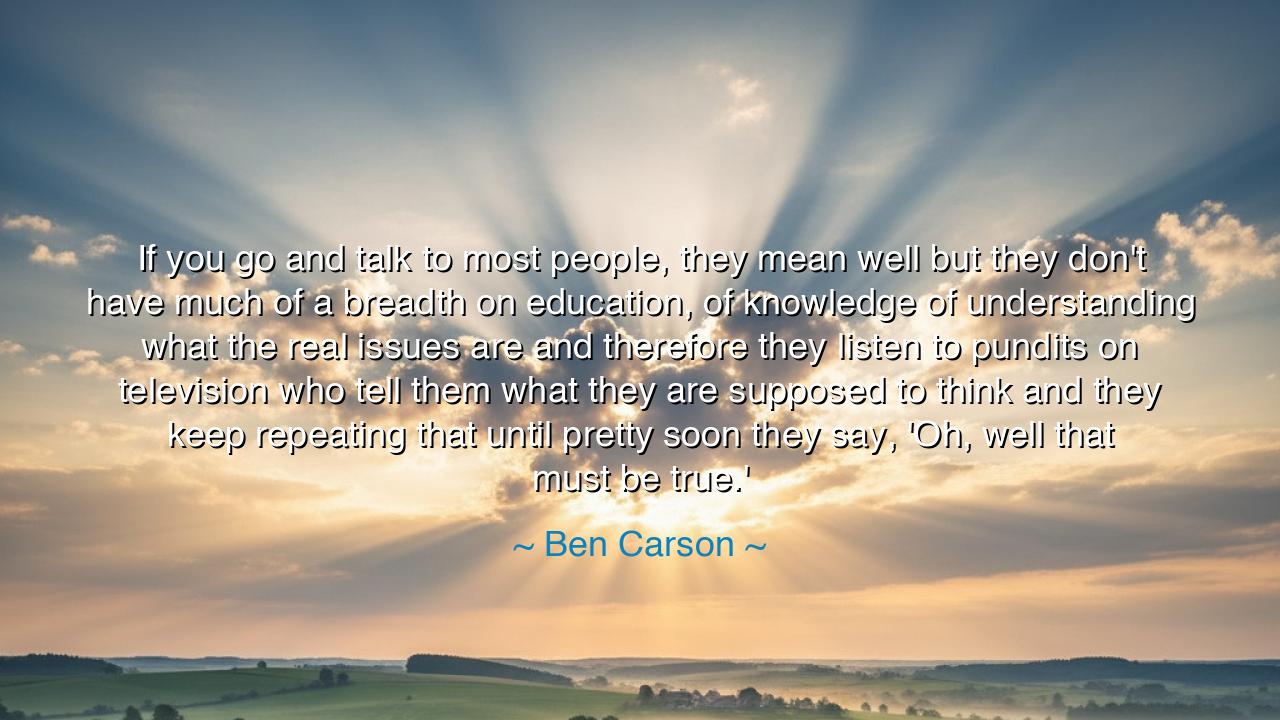
If you go and talk to most people, they mean well but they don't
If you go and talk to most people, they mean well but they don't have much of a breadth on education, of knowledge of understanding what the real issues are and therefore they listen to pundits on television who tell them what they are supposed to think and they keep repeating that until pretty soon they say, 'Oh, well that must be true.'






Hear the voice of Ben Carson, who once healed with steady hands and later sought to heal the divisions of his nation. He spoke thus: “If you go and talk to most people, they mean well but they don’t have much of a breadth on education, of knowledge, of understanding what the real issues are and therefore they listen to pundits on television who tell them what they are supposed to think and they keep repeating that until pretty soon they say, ‘Oh, well that must be true.’” These words ring like a solemn bell, calling us to beware the danger of ignorance dressed as wisdom, and to guard our minds against the easy chains of borrowed thought.
In this lament, Carson acknowledges the goodness of common people—they mean well—yet he warns that goodwill without understanding is fragile, easily bent by voices of authority. The ancients too spoke of this weakness: Plato, in his Republic, warned that the masses, untrained in truth, could be led astray by sophists—those cunning speakers who made the weaker argument appear the stronger. The same peril lives in our own time, where the glowing box of the television replaces the Athenian marketplace, and pundits fill the air not with wisdom but with persuasion.
Consider the fall of the Roman Republic. The citizens of Rome were once strong, disciplined by civic duty and hardened by history. Yet as centuries passed, wealth and comfort dulled their curiosity. Bread and circuses became their teachers. Politicians spoke what the people wished to hear, and the crowd, repeating the words of their leaders, mistook them for truth. Thus liberty gave way to Caesar, and the voice of the people was silenced beneath the empire’s crown. Carson’s words echo this lesson: when men cease to question and only repeat, they prepare the way for their own subjugation.
The heart of his message lies in the power of education. Without breadth of knowledge, a man cannot distinguish between truth and manipulation. He becomes like a leaf blown by the wind, carried not by his own roots of understanding but by the storm of rhetoric around him. Yet with education, the soul is anchored; with knowledge, one can test claims against reason, history, and conscience. Carson does not condemn the people for meaning well—he grieves that their goodwill is squandered when it lacks the shield of wisdom.
This truth is both warning and exhortation. For if we, in our own lives, rely only on voices from the screen, we too shall find ourselves parroting words we do not own. Our thoughts will not be our own thoughts, our convictions not our own convictions, but shadows placed in us by others. And soon, as Carson warns, we will say, “Oh, well that must be true,” though we have never examined the matter with our own minds. To live in such a way is not to live as free men and women, but as echoes.
The lesson, O seeker, is clear: seek out knowledge as one seeks water in the desert. Do not be content with opinions handed to you like bread from another’s table. Read, question, compare, reflect. Listen, but do not surrender your judgment. Ask yourself always: “Who gains if I believe this? Who profits if I repeat it?” For truth does not fear examination, but falsehood depends on silence and repetition.
Therefore, let Carson’s words endure in your heart: education is the armor of freedom, knowledge the weapon of discernment, and independent thought the lifeblood of a just society. Guard your mind against the chains of borrowed belief. Strive not only to mean well, but to understand well. For when a people combine goodwill with wisdom, they are no longer easily swayed by the voices of pundits, but stand as a nation of free souls, able to shape their own destiny.






AAdministratorAdministrator
Welcome, honored guests. Please leave a comment, we will respond soon